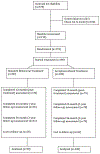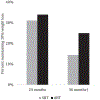Long-Term Follow-up of the Mind Your Health Project: Acceptance-Based versus Standard Behavioral Treatment for Obesity
- PMID: 30806492
- PMCID: PMC10225051
- DOI: 10.1002/oby.22412
Long-Term Follow-up of the Mind Your Health Project: Acceptance-Based versus Standard Behavioral Treatment for Obesity
Abstract
Objective: In the Mind Your Health Trial, acceptance-based behavioral treatment (ABT) for obesity outperformed standard behavioral treatment (SBT) at posttreatment. This trial compared effects over 2 years of follow-up.
Methods: Participants with overweight or obesity (n = 190) were randomized to 25 sessions of SBT or ABT over 1 year and assessed at months 12 (i.e., posttreatment), 24 (1 year posttreatment), and 36 (2 years posttreatment).
Results: Weight-loss differences previously observed at 12 months attenuated by follow-up, though a large difference was observed in the proportion of treatment completers who maintained 10% weight loss at 36 months (SBT = 17.1% vs. ABT = 31.6%; P = 0.04; intent-to-treat: SBT = 14.4% vs. ABT = 25.0%; P = 0.07). The amount of regain between posttreatment and follow-up did not differ between groups. ABT produced higher quality of life at 24 and 36 months. Autonomous motivation and psychological acceptance of food-related urges mediated the effect of condition on weight. No moderator effects were identified.
Conclusions: Overall, results suggest that infusing SBT for weight loss with acceptance-based strategies enhances weight loss initially, but these effects fade in the years following the withdrawal of treatment. Even so, those receiving ABT were about twice as likely to maintain 10% weight loss at 36 months, and they reported considerably higher quality of life.
Trial registration: ClinicalTrials.gov NCT00746265.
© 2019 The Obesity Society.
Figures




Similar articles
-
The mind your health project: a randomized controlled trial of an innovative behavioral treatment for obesity.Obesity (Silver Spring). 2013 Jun;21(6):1119-26. doi: 10.1002/oby.20169. Epub 2013 May 13. Obesity (Silver Spring). 2013. PMID: 23666772 Free PMC article. Clinical Trial.
-
Acceptance-based versus standard behavioral treatment for obesity: Results from the mind your health randomized controlled trial.Obesity (Silver Spring). 2016 Oct;24(10):2050-6. doi: 10.1002/oby.21601. Obesity (Silver Spring). 2016. PMID: 27670400 Free PMC article. Clinical Trial.
-
A randomized trial of an acceptance-based behavioral intervention for weight loss in people with high internal disinhibition.Obesity (Silver Spring). 2016 Dec;24(12):2509-2514. doi: 10.1002/oby.21680. Epub 2016 Nov 2. Obesity (Silver Spring). 2016. PMID: 27804255 Free PMC article. Clinical Trial.
-
[Emotional therapies for overweight or obesity].Encephale. 2019 Jun;45(3):263-270. doi: 10.1016/j.encep.2019.02.009. Epub 2019 Apr 5. Encephale. 2019. PMID: 30961969 Review. French.
-
Critical review and meta-analysis of multicomponent behavioral e-health interventions for weight loss.Health Psychol. 2018 Jun;37(6):501-515. doi: 10.1037/hea0000623. Epub 2018 May 7. Health Psychol. 2018. PMID: 29733617 Review.
Cited by
-
Telehealth acceptance and commitment therapy for weight loss: Protocol of the WeLNES full scale randomized controlled trial.Contemp Clin Trials. 2023 Mar;126:107091. doi: 10.1016/j.cct.2023.107091. Epub 2023 Jan 20. Contemp Clin Trials. 2023. PMID: 36682490 Free PMC article.
-
Feasibility/acceptability of an acceptance-based therapy intervention for diverse adolescent girls with overweight/obesity.Obes Sci Pract. 2021 Mar 1;7(3):291-301. doi: 10.1002/osp4.483. eCollection 2021 Jun. Obes Sci Pract. 2021. PMID: 34123396 Free PMC article.
-
Obesity: Treatments, Conceptualizations, and Future Directions for a Growing Problem.Biology (Basel). 2022 Jan 19;11(2):160. doi: 10.3390/biology11020160. Biology (Basel). 2022. PMID: 35205027 Free PMC article.
-
Rethinking emotional eating: Retrospective and momentary indices of emotional eating represent distinct constructs.Appetite. 2021 Dec 1;167:105604. doi: 10.1016/j.appet.2021.105604. Epub 2021 Jul 19. Appetite. 2021. PMID: 34293393 Free PMC article. Clinical Trial.
-
The Impact of Psychological Flexibility on Psychological Well-Being in Adults With Obesity.Front Psychol. 2021 Mar 22;12:636933. doi: 10.3389/fpsyg.2021.636933. eCollection 2021. Front Psychol. 2021. PMID: 33828505 Free PMC article.
References
-
- Weinsier RL, Nagy TR, Hunter GR, Darnell BE, Hensrud DD, Weiss HL. Do adaptive changes in metabolic rate favor weight regain in weight-reduced individuals? An examination of the set-point theory. Am J Clin Nutr 2000;72:1088–1094. - PubMed
-
- Lowe MR. Self-regulation of energy intake in the prevention and treatment of obesity: Is it feasible? Obes Res 2003;11(suppl):44S–59S. - PubMed
-
- Forman EM, Butryn ML. Incorporating acceptance approaches into behavioral weight loss treatment. In: Haynos AF, Lillis J, Forman EM, Butryn ML, eds. Mindfulness and Acceptance Approaches to Treatment of Eating Disorders and Weight Concern. Oakland, CA: New Harbinger; 2016.
Publication types
MeSH terms
Associated data
Grants and funding
LinkOut - more resources
Full Text Sources
Medical

